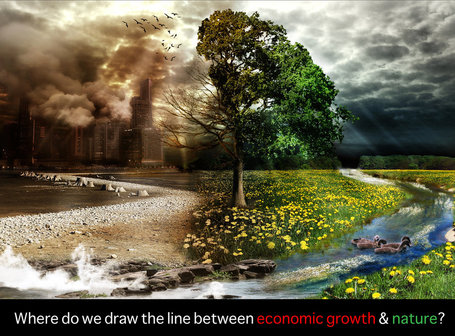In the second part of Peter Coates, Nature, he discusses landscapes and nature as an art form, the way we view nature as romanticists and ecologically, “green” movements, and the future of nature.

Purpose of ch 7 p138
Important concepts mentioned:
-Marxism (red greens – social ecologists)
Marx didn’t see aesthetic value in nature p150 “‘idiocy of rural life'” –> “enormous faith in industrialization and technological advance..”
-“But there is no single ‘green position’. Conservation, environmentalism and ecology come in many, often competing, shades of green.” 145
where do you stand and how do you think other organizations (like Sierra Club) fit into these shades of green?
-‘Environmental racism’: “the deliberate location of environmentally hazardous facilities in disempowered, low-income and ethnic/racial minority communities.” 157
Environmentalism and social justice go hand in hand; it is often seen if one is affected so is the other. Any examples?
-“New Ecology” 186
Interesting to think about:
-On page 112, Coates speaks of a Native American woman from the Yosemite Valley (which was originally used for farming, hunting, and recreational opportunities) and upon returning to the site after her peoples eviction, she “was unimpressed by subsequent changes in the land. Management (or lack of it) for the sake of wilderness values had fostered a landscape she thought untidy and overgrown.”
~It is just interesting to see such a perspective after stereotyping Native Americans as such natural beings.
–Black Act of 1723 115
-Hoare on Stourhead –> “he might be shocked to find that (with the exception of classical scholars) the majority of us are most impressed by the lake and the trees, see the monuments as little more than curious ornaments, even intrusions.” 119

ha-ha p120
Quotes:
-“A ‘place’ was not found, but made.” 115
-“Wilderness was the raw material out of which nature was fashioned- nature being the improved, privately owned landscape of farms, gardens, and rural estates that occupied the middle ground between industrial urban society and untamed savagery.” 123
People:
John Clare –> “Clare’s sensitivity to man’s savagery to to man and other creatures was so sharp that he is now embraced as a spiritual forefather of today’s radical environmentalism.” 114
Emerson–>”…belief that nature is found in essences rather than objects and the human impact cannot alter that essence promoted a naive faith in its immortality.” 137
Edward Carpenter –>..”celebrated the savage as a fitter being.”
-What defines savagery? Some societies seen as savage, some as civilized, but at times they all act in similar manners.
Francis Fukuyama –> “…singled out environmentalists as the greatest threat to history, defined not as ideological struggle but as the extension of human control over nature…because they brim with nostalgia for an earlier stage of historical evolution when nature was far more in control.” 174
Bill McKibben (<–please click this) –>”…we have so thoroughly domesticated the earth and modified natural processes that it is no longer possible to speak of nature as something with a separate existence.” 176
-How have we corrupted nature enough to make it our own and no longer a separate, natural process? Also, read last paragraph of 176
Questions:
1.) “…we perceive and evaluate natural objects and objects of art differently. Aesthetic experience of nature, he [Ronald] argues, involves immersion rather that detachment.” Ronald Hepburn (110)
How do you “frame” nature or see as worth framing? Can you give an example of the most picturesque place you have been? See page 132 for more interest

2.) Discuss difference between natural and cultural landscapes.
3.) “historicized countryside, a ‘landscape of exclusion’.” (111)
What do you see this description as?
4.) “The reasoning that, if nature is good, then human nuture must also be good…” 127
-hot debate in 18th century
5.) Do you feel happier as you get closer to nature? Can you rate happiness and emotion on a natural scale? (I don’t know what page this is on because my sticky note fell out…)
6.) “To me, high mountains are a feeling, but the hum of human cities torure…” 130 Byron’s Childe Harold
-In what environment do you feel most comfortable?
7.)”…for the first time, nature becomes purely an object for humankind, purely a matter of utility; ceases to be recognized as a power for itself…” 148
-Do you see nature as commodity or with an intrinsic purpose?
8.) “The crucial question is not how wild or natural nature is, but how healthy it is.” 190
-On a scale of 1 to 10, how healthy do you think our current environment is?

[…] 6: 10/2/12 Coates Nature (ch. […]